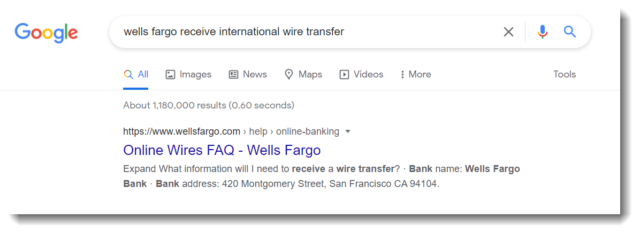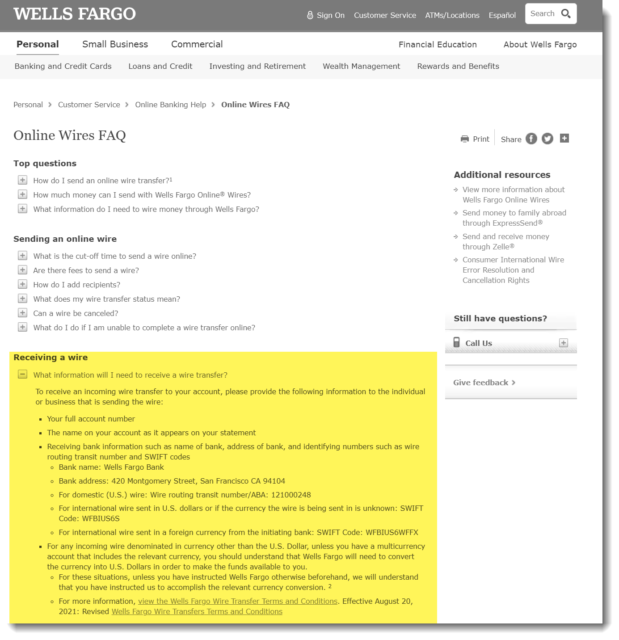This page is about receiving payments to your bank account held in a country other than than in the European Union (most commonly, that is USA, Canda, Russia, Ukraine, Australia, but all non-EU countries are included).
If your bank account is in the EU 🇪🇺 this page is not for you! See our EU bank accounts page. But also see the Receiving money from abbywinters.com page for general information on payments.
EFT to non-European Union countries
We want to make sure you get the money we send you, but sending Electronic Funds Transfers (EFT) to countries outside the EU can be complicated, and there is a risk of error in the payment details (see, What happens if I provide incorrect bank details?).
But don’t stress – we’re here to help! ☺️
How to find the bank details we need
Do a Google search for “[your bank name] [your country] receiving international wire transfer”. For example, in the same language your bank’s website is in, search for:
HSBC Canada receive international wire transfer
Check the results for a FAQ page or similar. For example;

We open the FAQ from the Google search, and we see the info for “Receiving a wire” has all the info we need;

Note that we’ll be sending what your bank considers a foreign currency (Euro), so a different SWIFT is used compared to sending US dollars in this example (your bank might be different). The word “domestic” in this context means “within your own country” – we never need that info, because we’re sending you money from a different country (the Netherlands 🇳🇱).
This is the information we need for sending you money via an international wire transfer:
Your bank’s country. That is, the country where you registered you bank account. Maybe that’s obvious to you, but it’s not to us!
Your full name. That is, as registered with your bank. Check your bank statement for this information, you can probably download a PDF when you log in to internet banking.
Your full bank account number
The SWIFT/BIC of your bank. This can just be for the head office of your bank, it does not need to be for your branch or state capital.
Your full home address, including the postcode and country, as registered with this bank.
Intermediary Bank SWIFT/BIC, only if your bank says this is necessary for a Dutch bank to send money to your bank account.
Any other info your bank says is necessary for us to send you money.
If you cannot find the info online…
Smaller banks and credit unions may not have this info on their website – and they may not even be able to receive international wires at all! But it’s worth checking: if you cannot find the info online, contact your bank directly.
When contacting your bank, it is essential you ask the right person and ask the right questions.
Ask the right person
🚨 DANGER: The right person is not the bank teller at your local branch – it’s likely this person never has to deal with international wire transactions, and so will not know the importance of the correct information (but they may try to be helpful, and provide dangerously incorrect information!). In our experience, asking the wrong person is the most common reason for a bank transfer to fail.
The best people to ask are those who work on the International money transfers desk. The main branch (usually in the capital city) will probably have a physical desk for this you can visit, but you can just call the customer service department, and ask to be transferred to them.
They will not ask you about the reason for wanting to receive money, so there’s no need to be embarrassed!
Ask the right questions
In our experience, people who work in banks want to help, but may not actually know the facts we need. So asking the right questions is still important – even if you are talking to someone working on an international transfers desk! The questions to ask are:
- Someone is wiring me money from the Netherlands. What info do I need to tell them, for the money to come to my account here?
- Is an intermediary / correspondent bank required? If so, what are their details?
- Why isn’t this information on your website, you clowns?! 🤡
Smaller banks can only accept international wires via a correspondent (also known as an “intermediary”) bank. When an intermediary bank is used, the money goes from us, to the correspondent bank, and then to your bank. You’ll need to provide us additional info about the correspondent bank (more background for nerds).
See other questions in our FAQ on payments.
